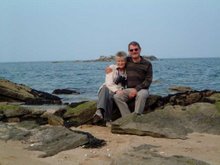Zion is a deadend
canyon about 8 miles long. It has been occupied for thousands of years by man.
First evidence is of primitive hunters, then from about 2,300 years ago came
the farmers, the Ancestral Puebloan Indians. These disappeared around 1200 AD
to be followed by the Southern Paiute Indians, and lastly Mormon settlers from
the 1850’s. It is a harsh climate of great heat in the summer and cold winters
but the canyon has a key feature in a desert area- water. The Virgin river runs
along its whole length.
The Paiutes still
claim affiliation with the Canyon based upon their occupation of the land for
many centuries. This early photo shows a tribal member in traditional clothes
and with hunting gear. He looks more at home in this environment than his
descendants today who own and run (inefficiently) the Indian Peaks campsite
where we’re staying.
We visited Zion on
a Sunday: it was packed. We queued to pay per car at the entry where the
rangers directed us to the only car park, which was full. Thanks. A second
consultation with the rangers revealed that there was plenty of parking in the
small town adjacent and a free shuttle bus.
Back at the Visitor
Centre some time later, courtesy of the free shuttle, we get a nice view of the
entrance to the canyon.
Now we board
another free shuttle bus to see the canyon itself. Private vehicles are
prohibited because the single narrow access road would be totally clogged with
visitors’ cars. The shuttle stops frequently at designated locations where you
can alight and walk and sightsee.
At this stop we
admired the peaks called the Three Patriarchs. Many of the names, including
Zion itself, were given by the Mormons, so are Biblical.
Now we reach the canyon
end, and get off again. It isn’t quite a dead-end as the Virgin river flows through
a narrows in the rocks called a slot canyon.
Despite
its constraints, a concrete path runs alongside the river for about a mile into
the narrows. It’s even wheelchair friendly, the surface is so good. Note two
things: Jane striding out along the path, and the green canyon wall. This is created
by water seeping continuously out of fissures in the rock thereby creating a
microclimate for plants and creatures. So it’s much more than just a slimy surface.
When
the made-up path runs out it’s just the river. Hardy explorers can carry on walking
up the river for another 12 miles, if you don’t mind wet feet. As you can see,
some are doing so. However, the Park Authorities sternly warn that you need
specialist footwear (can’t see any in the photo!) and check the weather
forecast as flash floods can be lethal.
We
make one more stop-off on the way back to see the view of the canyon featured in
most brochures. It was a bit misty from the heat haze by this time of the
afternoon but maybe that adds to the drama.
Despite
the crowds, Zion was beautiful and the weather perfect, if a little hot. We
drove out easily with no queues and were back at the campsite within an hour.








No comments:
Post a Comment